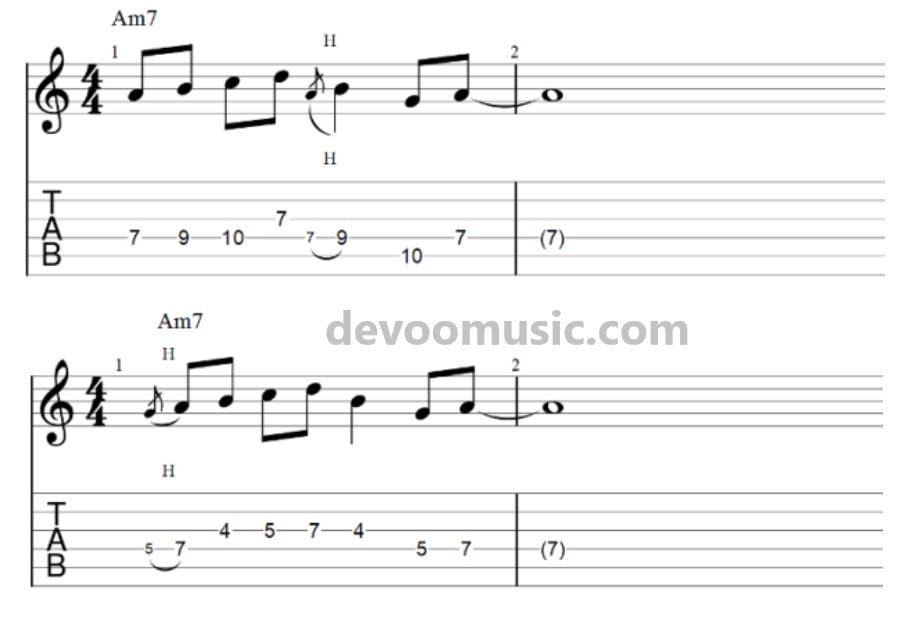Table of Contents
Guitar Lesson
“The Lick” is considered as the most famous phrase in jazz music (and also in other styles). It has been played so many times, by so many players, in so many tunes that it has become a cliche. Although there are a significant number of common jazz lines, this one is surely the most popular, an essential part of the Bebop language. This guitar lesson with tabs, charts and theory explains what is “The Lick”, how it is built and how to apply it in different harmonic contexts.
The lick is built with only five notes. The interval pattern is 1 – 2 (9) – b3 – 4 (11) – 2(9) – b7 – 1, making it a minor (Dorian) lick. As shown in the example below, in D minor the notes would be D (root), E (second or ninth) , F (minor third), G (fourth or eleventh) and C (minor seventh).

It is interesting to note that “the lick contains” a descending major triad (1 – 3 – 5), C Major triad in the example (G – E – C).
The last note which is actually the root (D), is approached from above and below by E and C. This is what we call a “Diatonic Enclosure”.
The second half of the bar starts with a down-beat on 3 and ends on the “and of 4”.
We can consider “The Lick” taken from the second mode of the major scale, the Dorian mode (1 – 2 – b3 – 4 – 5 – 6 – b7) which is a minor mode.

Basically, “the Lick” can be employed over minor chord types (min, m7, min9, min11 and min13). Here are some common guitar shapes.

The guitar tab below show how to play “the lick” in 12 minor keys following the cycle of 5ths.

Variations On The Lick
Here are some ideas to make evolve The Lick. There are several tools and guitar techniques that help to embellish the basic line as grace notes, passing tones, rhythmic variations, etc.
Adding Grace Notes
Try adding one or both of these chromatic approach note using fretting hand guitar techniques as slides, hammer-on, pull-off, bends.

Adding Passing Tones
These two exercises contains passing tones that make the link between two notes of The Lick. In the first example, C# makes the link between C and D respectively the minor third and fourth of Am7.

This second example contains an extra note (G#) between G and A.

Adding Chords
Here, some chords are integrated in The Lick. The first chord is an inverted E minor (third in the bass), the second chord is an Am.

Here two notes are harmonized in fourths (quartal harmony), giving a modern cool sounding to the phrase.

Pickup Notes
Adding a pickup note adds a little bit of dynamism to the Lick.

Rhythmic Variations
Adding syncopations add rhythmic interest.

“The Lick” Over Common Chord Progressions
The following show how to play the lick in different harmonic contexts.
Modal Progression – So What Style
Here is a modal example in the style of So What (Miles Davis). The lick is played in Dm7 then in Em7, included fourth chords (Em7add11, Dm7add11 and F#m7add11).

Long II V I
Here, The lick is played over Dm7, the ii chord of C major. The ii V I progression being Dm7 G7 CMaj7.

Short Minor II V I
Here The Lick (key of Dm7) is played over the iim (Em7b5) and V7 of a short minor 2 5 1 progression.

